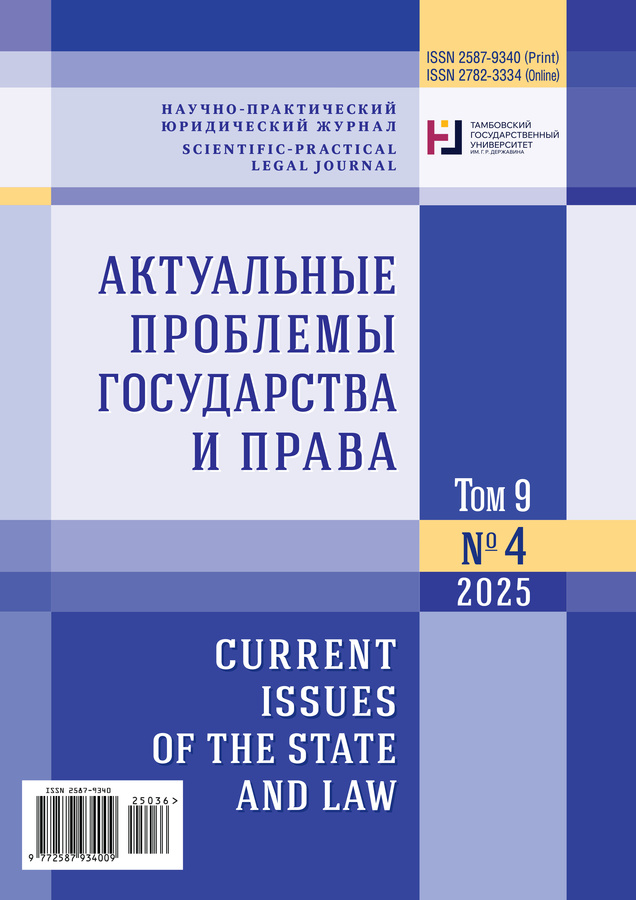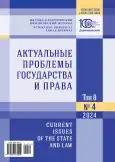БРИКС как инструмент международного сотрудничества в условиях глобальных кризисных ситуаций
- Авторы: ПОНОМАРЕНКО С.В.1
-
Учреждения:
- ФГБОУ ВО «Луганский государственный аграрный университет им. К.Е. Ворошилова»
- Выпуск: Том 8, № 4 (2024)
- Страницы: 552-558
- Раздел: Проблемы частного и публичного права
- URL: https://journal-vniispk.ru/2587-9340/article/view/303585
- ID: 303585
Цитировать
Аннотация
БРИКС играет ключевую роль как платформа для укрепления международного сотрудничества в условиях глобальных кризисов, где вопросы правового регулирования межгосударственных отношений приобретают новую актуальность. Будучи объединением крупных развивающихся экономик, БРИКС делает акцент на равноправном диалоге, устойчивом развитии и противодействии односторонним санкциям и экономическим ограничениям и правовому взаимодействию. Стратегический подход организации основан на продвижении многополярности, защите культурного суверенитета и непринятии любых форм дискриминации или внешнего диктата, что позволяет БРИКС выступать противовесом западноцентричным моделям глобального управления. Именно создание новых союзов и попытки расширения значения существующих межгосударственных механизмов поднимают на поверхность вопросы совершенствования форматов международного сотрудничества, а БРИКС – это один из ключевых вариантов многостороннего сотрудничества, нацеленный на формирование собственной модели взаимодействия. Предложены выводы, что возрастающее влияние системы геополитических факторов стимулирует необходимость выработки новых правовых методов, подходов и инструментов в рамках стратегии безопасности при выработке новых приоритетов БРИКС. Результаты настоящего исследования способствуют развитию теоретических и практических основ в ракурсе правового регулирования международных отношений.
Об авторах
Светлана Валериевна ПОНОМАРЕНКО
ФГБОУ ВО «Луганский государственный аграрный университет им. К.Е. Ворошилова»
Автор, ответственный за переписку.
Email: sssvetlanaurist@yandex.com
старший преподаватель кафедры Экономика предприятия, управление трудовыми ресурсами в АПК и права
Россия, Российская Федерация, 291008, Луганская Народная Республика, г. Луганск, г.о. Луганский, р-н Артемовский, тер. ЛНАУ, 1Список литературы
- Герасимов В.И., Коданева С.И. Научно-технологическое и инновационное сотрудничество стран БРИКС: тенденции, перспективы и вызовы // Управление наукой: теория и практика. 2023. Т. 5. № 1. С. 204-229. https://doi.org/10.19181/smtp.2023.5.1.12, https://elibrary.ru/spbdjz
- Дроган Т.О. Принцип недискриминации по признаку инвалидности в международном праве и законодательстве стран БРИКС // Актуальные проблемы гуманитарных и естественных наук. 2019. № 7. С. 69-73. https://elibrary.ru/tatrej
- Бокерия С.А., Сидоров Д.А. Эволюция подходов стран БРИКС к «Ответственности по защите» // Политическая наука. 2020. № 3. С. 190-214. https://doi.org/10.31249/poln/2020.03.09, https://elibrary.ru/zpuzqk
- Мантусов В.Б. Интеграционные процессы и сотрудничество России со странами БРИКС // Вестник Российской таможенной академии. 2022. № 3. С. 9-23. https://doi.org/10.54048/20727240_2022_03_09, https://elibrary.ru/petvms
- Асадов Б.Р., Гавриленко В.А., Немченко С.Б. Вопросы теории международного сотрудничества в сфере безопасности в рамках БРИКС // Актуальные проблемы государства и права. 2022. Т. 6. № 3. С. 437-449. https://doi.org/10.20310/2587-9340-2022-6-3-437-449, https://elibrary.ru/fgjhpt
- Ярыгина И.З., Боровикова О.А. БРИКС+ как фактор экономического роста и инвестиционного развития // Экономика. Налоги. Право. 2019. Т. 12. № 4. С. 111-120. https://doi.org/10.26794/1999-849X-2019-12-4-111-120, https://elibrary.ru/kgrmxm
- Болаев А.В. Инвестиционная активность Китая в проекте «Один пояс и один путь» // Вопросы инновационной экономики. 2023. Т. 13. № 4. С. 1825-1834. https://doi.org/10.18334/vinec.13.4.120105, https://elibrary.ru/blxbqh
Дополнительные файлы









